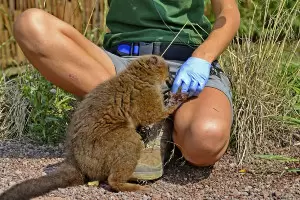
Mammalogy is a specialized field of biology that deals specifically with the study and observation of mammals. This could include many different aspects of mammalian life, including evolution, biological function, management, and more.
What Does a Mammalogist Do?
Mammalogists may do a number of different things depending on their area of specialty. Broadly, Mammalogists study and observe different kinds of mammals. Many take interest in one specific type of or group of mammal. Some of the things Mammalogists may study include but are not limited to: the animal's behavior in its natural habitat, its classifications among other species, its anatomy and physiology, its role in a larger ecosystem, or the way this animal interacts with human beings. A Mammalogist may also combine multiple areas of study depending on their exact position or role.
Where Does a Mammalogist Work?
Mammalogists may work in any number of different locations, depending on their area of specialization or interest. Some Mammalogists spend a great deal of time working with and caring for mammals on a daily basis. Other Mammalogists spend a great deal of time in the field, observing and collecting data about a particular mammal. Fieldwork can take place in remote environments, meaning that a Mammalogist must be comfortable spending a lot of time alone. Fieldwork is often both physically and emotionally taxing for these reasons. Most Mammalogists work full-time, but may find themselves working long or strange hours when performing fieldwork. Working with nocturnal mammals could denote extensive nightshift work.
What Is the Average Mammalogist Salary?
Mammalogists, who fall under the broader BLS category of zoologists and wildlife biologists, earned a median salary of $70,600 as of May 2023.*
Most Mammalogists work for the state and federal governments, while a smaller percentage work for scientific consulting services or institutes of higher education.
Mammology Jobs
Full-time mammologist careers are quite specialized and not common, given how narrow in scope they can be. Additionally, most mammologist jobs specialize further in animals that belong to a certain family or that are found in a particular region of the world. While jobs do vary, there are many tasks that are common to most mammologist careers, like:
- Plan and coordinate mammal assessment activities
- Act as advocate and spokesperson for animals and ecosystem concerns within that specialty
- Connect with other scientists, professionals, and advocacy groups to preserve and monitor habitats and populations in the wild and in protected environments
- Draft reports and presentations for internal and external stakeholders, policy-makers and the public
- Collect samples and conduct research in the lab, the field, and protected environments
- Monitor and document mammal behavior in the lab, the field, and protected environments
- Make sure data/specimen collection and recordkeeping is accurate and adheres to relevant safety procedures
- Link with national, regional and international databases in order to share information and assessment data
- Review current research and scientific literature in the field
- Implement strategies and participate in associated sediment and flow monitoring
- Consult on and implement habitat mitigation and remediation measures
- Consult on environmental and site assessments
- Be prepared for travel to temporary field assignments in remote locations
Second-tier mammologist roles often have an additional level of managerial tasks to facilitate the project's timing, budgeting, and communications needs. Some common tasks may include:
- Planning and scheduling research trips and associated logistics
- Presenting findings and research to stakeholders
- Constructing budgets and timelines for workgroup
- Serving as point of contact for peer-review data calls and planning
- Serving on agency working groups to provide consultancy
- Conducting reviews of records, reports, and assessments
- Coordinating technical details for a range of cross-disciplinary projects
- Coordinating data collection and input, interpretation, and reporting
- Navigating environmental regulations and environmental approvals processes
What Is the Job Demand for Mammalogists?
The job demand for Mammalogists is expected to grow 4% in the ten-year period leading up to 2033, which is in line with the national average for all professions.* Though increasing environmental concerns and a growing human population will increase demand for Mammalogists, the number of positions open will largely depend on government budgets.
What Are the Education Requirements to Become a Mammalogist?
Mammalogists require a bachelor's degree for entry-level positions, though many go on to obtain a master's degree or Ph.D. Some recommended majors for a bachelor's degree include zoology, biology, or other related field.
Knowledge of Geographic Information Systems (GIS) and other software can help Mammalogists gather data efficiently and be able to improve their performance during fieldwork. After earning a Ph.D., some Mammalogists will go on to teach at universities full-time or to supplement their current income.
Degrees Related to Mammalogists
What Kind of Societies and Professional Organizations Do Mammalogists Have?
Mammalogists and those who wish to become Mammalogists can look to the following government websites for guidance:
- National Park Service (NPS) is a bureau of the U.S. Department of the Interior that is responsible for supporting local history and natural lands in America. Many Mammalogists are employed by the government in some capacity, making this website a potential resource for some.
Mammalogists can also browse through these organizations and websites for valuable resources:
- American Society of Mammalogists (ASM) This professional society for Mammalogists boasts around 2,500 members that work in many different aspects of the industry. This organization gives members access to grant opportunities, industry-specific publications, continuing education, and group meetings. Overall, this society is dedicated to furthering the careers of Mammalogists everywhere.
- American Institute of Biological Sciences (AIBS) is a nonprofit association that brings together biological researchers of all kinds from the United States. The focus on this organization is to spread information associated with the promotion of the field and showing its importance through advocacy and public policy efforts.
*2023 US Bureau of Labor Statistics salary figures and job growth projections for zoologists and wildlife biologists reflect national data not school-specific information. Conditions in your area may vary. Data accessed November 2024.





